Workshops
and Events
My international research profile is evidenced by the number of invitations I received to lead events and visits, which is the reporting period of this submission. These opportunities provide the means to disseminate my research to international policy makers, industrialists and academics. They generate impact and enable me to play a leading role in shaping the built and human environment links to disaster mitigation and reconstruction, incorporating inclusiveness and social responsibility.
Gender responsive DRR governance: what do we need to empower women in DRR and how do we get there? Member of the Extended Gender Expert and Women’s Resilience to Disasters (WRD) Group Meeting.
Held at the UN Global Platform for Disaster Risk Reduction is a multi-stakeholder forum, an avenue to share knowledge and discuss the latest developments and trends in reducing disaster risk. The UN General Assembly recognizes the Global Platform as a critical mechanism to review progress on the implementation of the Sendai Framework for Disaster Risk Reduction. Specific input from this session towards the UN Global platform co-chairs summary included: i) the gender and intersectional dimensions of disasters; ii) the importance of addressing structural barriers to women’s leadership voice, agency, meaningful participation and advocacy for gender-responsive resilience; iii) the need to galvanise and support grassroots organisations and networks including through increased funding; iv) the importance of promoting a gender-responsive and inclusive Midterm Review process of the Sendai Framework; and v) a call to develop a gender action plan to support gender-responsive implementation of the Sendai Framework. UNDRR, Australia aid, UN Women, May 2022.

Panelist of the World Urban Forum (WUF) 11: Networking event: Disaster Risk Reduction COVID-19 preparedness at local level, World Urban Forum, 11th session, 26-30 June 2022, Katowice, Poland.
This high-level panel discussed how cities managed to adapt to the COVID-19 crisis and the lessons learned. This session showcased how cities and partners are working together under the framework of Resilient 2030 initiative to create solutions and share these practices with peer cities. It provided critical problems that need to be better understood to improve epidemic and pandemic preparedness level.The World Urban Forum (WUF) was established in 2001 by the United Nations to address one of the most pressing issues facing the world today: rapid urbanization and its impact on communities, cities, economies, climate change and policies. Convened by UN-Habitat, the Forum is a high level, open and inclusive platform for addressing the challenges of sustainable urbanization and is the foremost international gathering for exchanging views and experiences on sustainable urbanization in all its ramifications. This session is organized by the Making Cities Resilient 2030 (MCR2030) Regional Coordination Committee in Europe and Central include several UN Agencies, such as UNDRR, UNDP, UNECE, UN-Habitat and WHO, different cities’ international organizations such as Resilient Cities Network, ICLEI, the Swedish Civil Contingencies International Federation of Red Cross and Red Crescent Societies, and the University of Huddersfield, UK. Dilanthi Amaratunga
Invited Panellist at the ceremonial launch of the Sri Lanka National Science Foundation (NSF) global digital platform (GDP), under the patronage of Hon. Mahinda Rajapaksa, Prime Minister of the Democratic Socialist Republic of Sri Lanka. February 2022
The NSF State-of-the-art Global Digital Platform (GDP) to harness Sri Lankan expatriates for national development has the requisite capabilities and features to harness, mobilize and channel intellectual assets at home and overseas. NSF is the premier national institution in Sri Lanka mandated to promote R&D and scientific literacy for the socio-economic development and wellbeing of its people.



Panellists at the Round Table Discussion on Climate Change and its impact of the Built Environment, Colombo, Sri Lanka, 23rd March 2022
Dilanthi Amaratunga and Savindree Nissanka
Orgnaised by University of Moratuwa, Sri Lanka in collaboration with the EU Erasmus+ co-funded collaborative research project, “BEACON (Built Environment leArning for Climate adaptatiON)”. The intervention was on the Climate Change Adaptation and Disaster Risk Reduction Policy Coherence. This session examined the resilience of the built environment to the impacts of climate change.
- Panellists of the CLIMATE CHANGE AND THE 2030 AGENDA FOR SUSTAINABLE DEVELOPMENT: THE CASE FOR POLICY COHERENCE international dialogue, 11th of February 2022
Dilanthi Amaratunga, Richard Haigh and Sahvindree Nissanka
Orgnaised by University of Colombo, Sri Lanka, in collaboration with the EU Erasmus+ co-funded collaborative research project, “BEACON (Built Environment leArning for Climate adaptatiON)”.The intervention was on the Paris Agreement, Sendai Framework and 2030 Agenda –Need for coherence in implementation. The session provided insights on the coherence of the Paris Agreement on Climate Change and the Sustainable Development Goals in the discourse of coastal built environment.
- Panellist on the University Enterprise Collaboration for Disaster Resilience: Opportunities in the Sri Lankan Context, 15th March 2022 Organised as part of the Colombo Symposium hosted by the SECRA team of the University of Sri Jayewardenepura, Sri Lanka. The intervention was on the pathways to research, collaborate, as well as seek funding for projects related to disaster resilience.
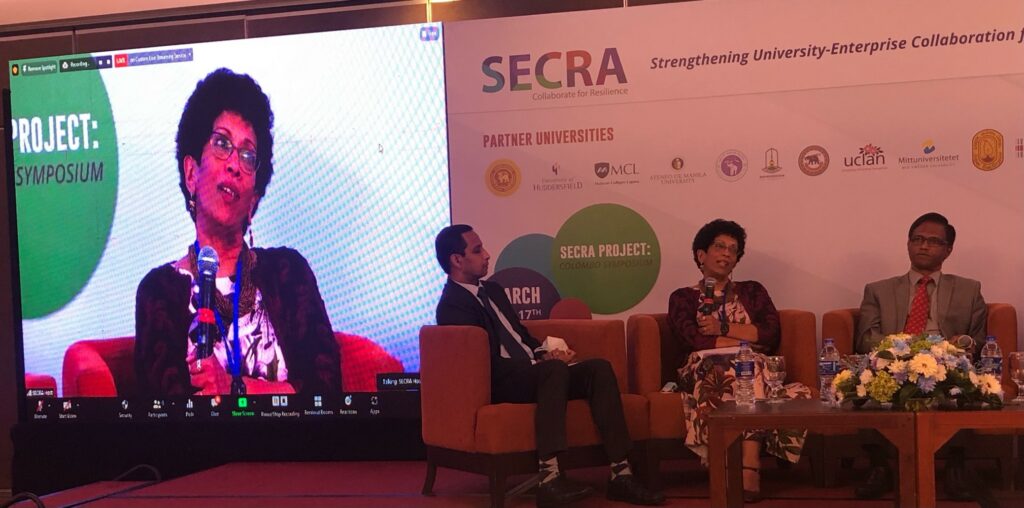
Panellist at the Round Table Discussion on Climate Change and its impact of the Built Environment, Colombo, Sri Lanka, 23rd March 2022
Organised by University of Moratuwa, Sri Lanka in collaboration with the EU Erasmus+ co-funded collaborative research project, “BEACON (Built Environment leArning for Climate adaptatiON)”. The intervention was on the Climate Change Adaptation and Disaster Risk Reduction Policy Coherence. This session examined the resilience of the built environment to the impacts of climate change
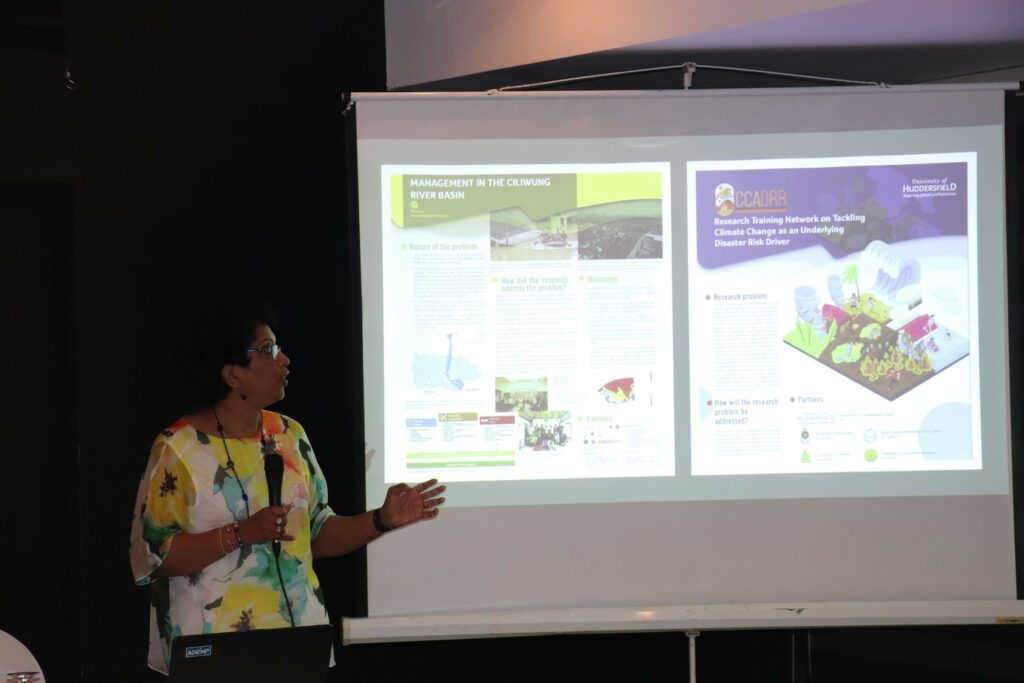
Guest Speaker at the ANNUAL GENERAL MEETING 2022, The Association for Disaster Risk Management Professionals (ADRiMP) Sri Lanka, 23rd March 2022
The Association for Disaster Risk Management Professionals (ADRiMP) Sri Lanka is an assembly of professionals representing varied disciplines to nurture a culture of safety in Sri Lanka from the impact of disasters and provides a platform for dialogue to achieve effective implementation of the Sendai Framework for Disaster Risk Reduction (2015-2030). The intervention was on Climate Change Adaptation and Disaster Risk Reduction Policy Coherence : For Safer Sri Lanka
Speaker at the “Private Sector Preparedness for Pandemics and Multi-Hazard Scenarios”, Colombo, Sri Lanka 30th of March 2022
This event which served as the launch for the Position Papers on ‘COVID: Economic Preparedness and Building Resilience’ was organised by the Ceylon Chamber of Commerce (CCC), the Social Policy Analysis and Research Centre (SPARC) of the Faculty of Arts, University of Colombo (UoC) and the Global Disaster Resilience Centre (GDRC) of the University of Huddersfield University of Huddersfield (UK) . It also helped to gain fresh perspectives by reflecting on the developments since April 2021 in private sector responses to and recovery from the effects of the COVID-19 pandemic in Sri Lanka to further enhance the findings from the round table discussions.
Invited speaker VALEDICTOTY CEREMONY of the INTERNATIONAL CONFERENCE CHALLENGES TO DISASTER RISK REDUCTION AND RESILIENT HABITAT, April 5-6, 2022
This was held IN ASSOCIATION WITH UNIVERSITY OF DELHI, NATIONAL INSTITUTE OF DISASTER MANAGEMENT, MINISTRY OF HOME AFFAIRS, GOVERNMENT OF INDIA & INTERNATIONAL GEOGRAPHICAL UNION COMMISSION ON HAZARD AND RISK. The intervention was on the Challenges to Disaster Risk Reduction and Resilient Habitat. The conference aims to highlight the challenges linked to disaster preparedness, risk reduction, resilient habitat, and problems of implementation due to lack of local level capacities. This conference also intends to provide a platform for the discussions to explore how we can improve resilience against disaster and secure our habitat or mitigate risks related to disasters. It highlights on resilient human habitat and emphasizes on making our cities and habitats safer for living, resisting damage and recovering faster.



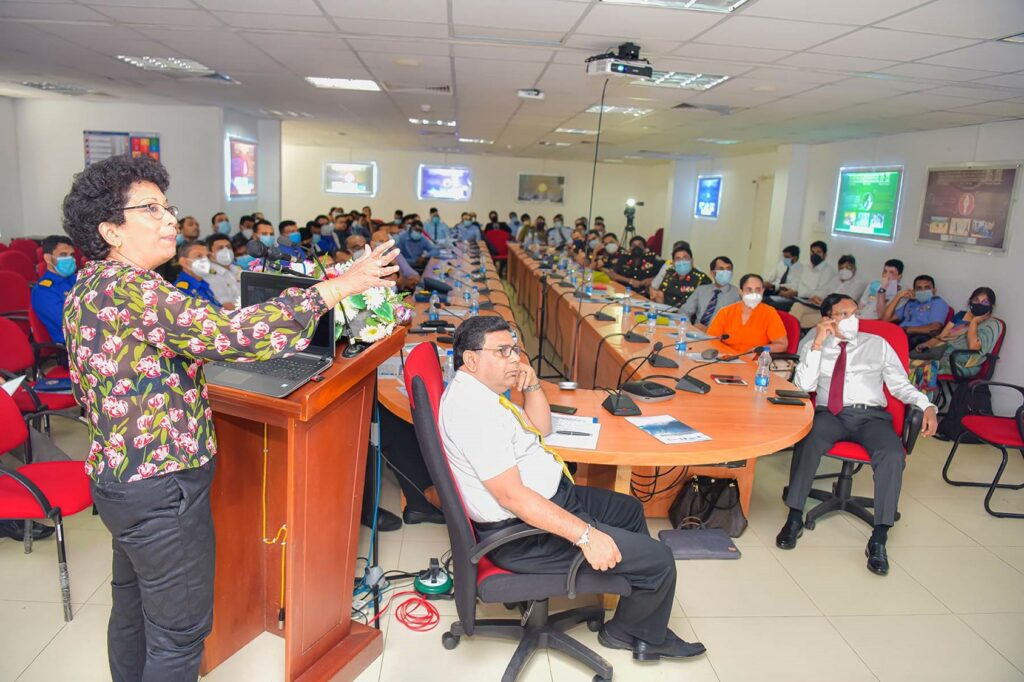
Lead facilitator/ Speaker, Tsunami Ready Community Launch Event Programme in Sri Lanka, State Ministry of Disaster Management, Sri Lanka. 20 April 2022
Indian Ocean Tsunami Ready Programme, led by the ICG/IOTWMS, encourages member states to commit to implement the UNESCO-IOC Tsunami Ready guideline and indicators and promote open access to high-resolution near shore bathymetry and topography data for accurate inundation and evacuation mapping in support of Tsunami Ready communities. It is a A community performance-based programme, based on a set of indicators, that facilitates tsunami preparedness as an active collaboration of the public (community), community leaders, local and national emergency management agencies. Intervention covered: End to End Tsunami Warning System; Building Community preparedness; IOWAVE Exercises; Making coastal communities tsunami ready; Tsunami ready in the Indian Ocean and its implementation ; Benefits, Roles and Responsibilities of Stakeholders; and International Recognition
- UNDRR European Forum for Disaster Risk Reduction (EFDRR) Plenary on COVID 19 and Systemic Risks in Europe
Scope: This plenary session focused on how the region can draw lessons from the COVID-19 pandemic for increased understanding of how to mitigate the effects of systemic risk. The panellists analysed the challenges currently being faced and contribute to thinking that could shape the COVID-19 recovery. It also examined the current lessons learnt, best practices and strategies identified, innovations achieved, and knowledge and experience gained in combating the pandemic and potential systemic risks. The outcomes of the session contributed to rethinking how we govern systemic risks.
Organiser: UNDRR as part of the European Forum for Disaster Risk Reduction (EFDRR). The Forum, hosted by Portugal and organized by the United Nations Office for Disaster Risk Reduction (UNDRR) in partnership with the European Commission and the Council of Europe
Role: organisation team co -lead
Date: Thursday, 25th November 2021 , Matosinhos, Portugal
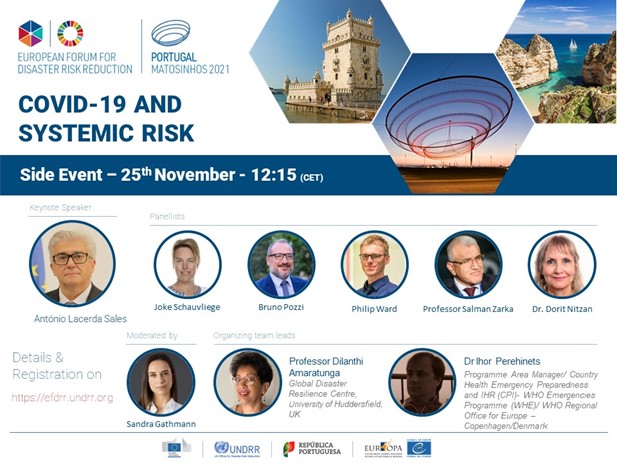
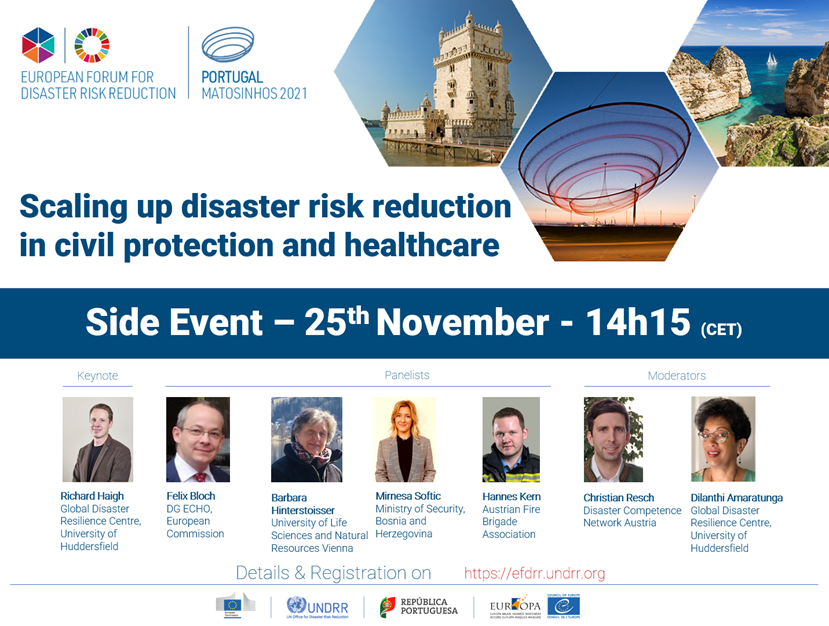
- Side event on Scaling Up DRR in Civil Protection and Healthcare session at the 2021 European Forum for Disaster Risk Reduction
Scope: This event raised awareness about the initiatives at EU level to connect knowledge holders addressing an emerging and changing risk landscape; identified gaps COVID-19 has exposed in terms of the complexity and non-linear nature of systemic risk; communicated evidence and lessons from the wide variations in impacts of COVID-19 to the civil protection domain; and shaped the ways forward to facilitate the increasing complexity and interdependency of risks in DRR strategies and plans at national and local level
Organiser: Disaster Competence Network Austria, AUSTRIA, and Global Disaster Resilience Centre, University of Huddersfield, UNITED KINGDOM, as part of European Forum for Disaster Risk Reduction (EFDRR), organized by the United Nations Office for Disaster Risk Reduction (UNDRR) in partnership with the European Commission and the Council of Europe
Role: session co lead, keynote speaker
Date: 25th November 2021, Matosinhos, Portugal
- Main event on Resilient Infrastructure
Scope: This main event identified the key factors that make infrastructure resilient including risk, recovery and functionality aspects, and review the status of resilient infrastructure in Europe and Central Asia; discussed the role of governance and policy mechanisms in making infrastructure resilient, and identify pathways to deal with complex interdependencies in order to facilitate evidence-based decision making; and identified how governments, policy makers and the private sector can step-up and deliver on their commitments
Organiser: UNDRR as part of the European Forum for Disaster Risk Reduction (EFDRR). The Forum, hosted by Portugal and organized by the United Nations Office for Disaster Risk Reduction (UNDRR) in partnership with the European Commission and the Council of Europe
Role: Invited panelist
Date: 26th November, Matosinhos, Portugal
- Workshop on the strategic pathway for further international cooperation for the Indian Ocean Tsunami Warning & Mitigation System within the UN Decade for Ocean Science
Scope: Core aim of the discussions was to develop a framework for action on a “Tsunami Dedicated Decade” under the UN Decade of Ocean Science for Sustainable Development (2021-2030).
Organiser: UNESCO Intergovernmental Oceanographic Commission (IOC) and the Secretariat for the Indian Ocean Tsunami Warning and Mitigation System (IOTWMS) (10th November 2021)
Role: invited experts
- CIB ECR Event – Research Grant Funding
Scope: The aim is to guide ECRs in research grant applications. The session provides an opportunity for ECRs to pose questions to the expert panel.
Organiser: The International Council for Research and Innovation in Building and Construction (Conseil International du Bâtiment). CIB is a worldwide network of more than 3,000 experts from 95 organisations focused on all aspects of research and innovation in building and construction (15th September 2021)
Role: Panellist
- Workshop in Scientific Writing and Publishing for Indonesian researchers in disaster risk and related subjects
Scope: Organised an online workshop for Indonesian doctoral students and researchers working in disaster risk and related subjects, who are new to publishing or wish to refresh their skills.
Organiser: This event was supported by the 2019 Newton Prize, Government of Indonesia, University of Huddersfield UK, British Council Newton Fund Impact Scheme, British Council Newton Fund Institutional Links Scheme, Emerald Publishing (10th -11th June 2021)
Role: Main organiser, keynote speakers and facilitators
- Writing articles for high impact journals
Scope: Webinar on ‘Writing articles for high impact journals: a guide to young scientists’,
Organiser: National Science Foundation (NSF) of Sri Lanka, Sri Lanka Association for the Advancement of Science (SLAAS), and Institution of Engineers of Sri Lanka (IESL) (25th May 2022), There were 1000+ participants
Role: Facilitator
- Effective proposal writing and acquiring foreign funded research projects
Scope: Introduction to experience in securing external grants; Examples of successful grant applications; and Tips for organising and preparing a successful proposal (May 2021)
Organiser: University of Ruhuna, BRITAE research project on Resilience Building in Tropical Agroecosystems
Role: Invited facilitator of the BRITAE Professional development workshop for academics and stakeholders (Industries)
- The Role of Built Environment in Disaster and Relocation
Scope: Certificate Course in Urbanization, Climate Change, Displacement and Relocation
Organiser: SPARC (Social Policy Analysis and Research Centre, University of Colombo (27th February 2021)
- Interdisciplinary Policy dialogue On COVID 19: Impact, Mitigation, Opportunities and Building Resilience. Moderator of the Interdisciplinary Policy dialogue On COVID 19: Impact, Mitigation, Opportunities and Building Resilience, held on the 28th January 2021 in Colombo, Sri Lanka. It was organised by the National Science Foundation of Sri Lanka.
- Sustainable Future and Climate Change: Insights from Adaptation Gap Report 2020. Invited panellist at the Sustainable Future and Climate Change: Insights from Adaptation Gap Report 2020, held on the 25th January 2021. It was organized by the National Institute of Disaster Management, Ministry of Home Affairs, Government of India, jointly with: Department of Science & Technology (DST), GoI; UN – World Food Programme; United Nations Environment Programme; International Water Management Institute – CGIAR; Gorakhpur Environmental Action Group; UNICEF; ICUN-Council of Ecosystem Management; UN-ESCAP.
- Integrating Epidemic and Pandemic Preparedness into Disaster Risk Reduction. A Panellist at the International Plenary Session on Integrating Epidemic and Pandemic Preparedness into Disaster Risk Reduction, held on the 15th December 2020, Colombo, Sri Lanka
- Special session on “Disaster Risk Reduction for sustainable built environment”. Chaired a special session on “Disaster Risk Reduction for sustainable built environment”, at the 11th International Conference on Sustainable Built Environment, held from 10th – 12th December 2020, in Kandy, Sri Lanka
- Let’s Talk DRR. A panellist at the “Let’s Talk DRR”, A Series of UNESCO and U-INSPIRE Alliance Virtual Conversation on SETI for DRR Science into action in Disaster Risk Reduction, held on the 20th November 2020, Jakarta, Indonesia
- COVID-19: Impact, Mitigation, Opportunities and Building Resilience: From Adversity to Serendipity. A strategic partner of the National Science Foundation of Sri Lanka (NSF) conducted 2-day national inter disciplinary conference titled “COVID-19: Impact, Mitigation, Opportunities and Building Resilience” under the theme “From Adversity to Serendipity” from January, 27-28, 2021.
- International Expert and a Co-I, Australian Research Council (ARC) funded Research Hub for Transformation of Reclaimed Waste Resources to Engineered Materials and Solutions for a Circular Economy. This grant is valued at $ 12.4 million cash + $ 6 million in kind. Project investigators are from: RMIT; The University of Melbourne; UNSW, Sydney; The University of Queensland; Deakin University; The University of Adelaide; Western Sydney University; and University of Technology, Sydney; University of Huddersfield, UK; University of Texas, USA; Hokkaido University, Japan; Lulea University of Technology, Sweden. And it has 32 industrial partners!
- Appointed by UNDRR as a panellist to formally review DRR National Strategy Assessment of Bulgaria. Other panellists included representatives from Government of Bulgaria (Director of State Control and Preventive Activity Directorate; Head of Preventive Activity Department; Head of Disaster Risk Reduction); Sendai National Focal Point – Sweden; Sendai Technical Focal Point – Serbia; 100 Resilient Cities Initiative – Local-level resilience; Joint Research Centre of the European Commission; the World Bank. May 2020.
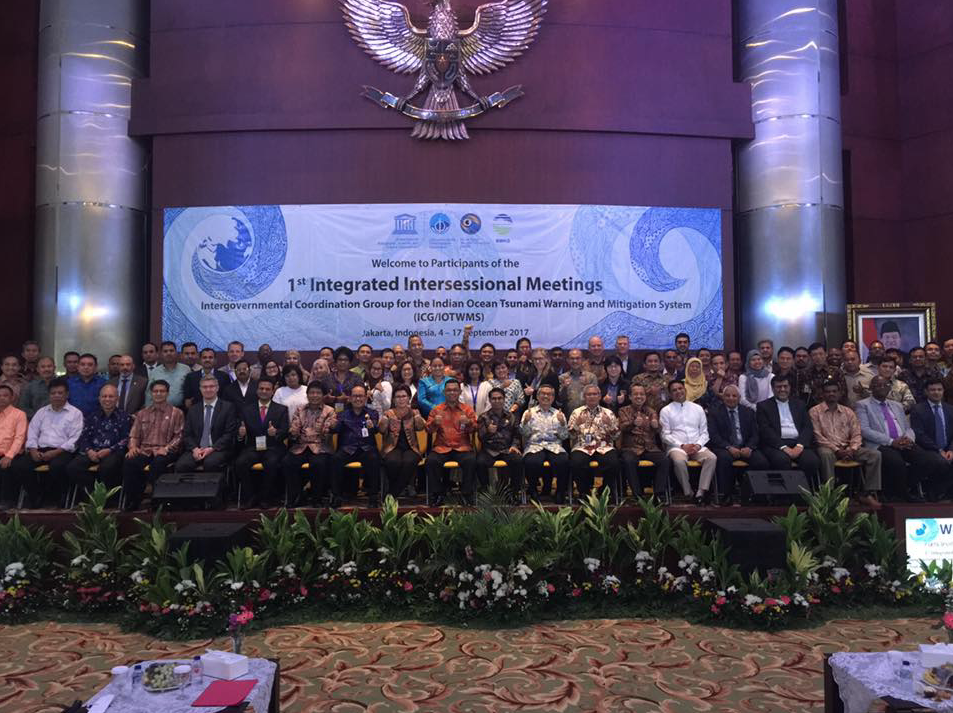
- Invited Panellist, Special session on the EU funded multi hazard early warning project, with interesting discussions on the impact of early warning on small island states, at the SBE19 Malta INTERNATIONAL CONFERENCE on Sustainability and Resilience, University of Malta, Malta, November 2019.
- Session lead on Scientific Writing, NBRO (National Building Research Organisation of Sri Lanka) April 2020.
- An invited Facilitator at the International Workshop on LOCAL DISASTER RISK REDUCTION STRATEGIES, UNDRR Global Education Training Institute (GETI), Incheon, Republic of Korea, held from 1st – 3rd October 2019. Recognising the urgency in developing local disaster risk reduction strategies, as a necessary condition to promote local action, ‘local disaster risk reduction strategies and plans are necessary to ensure the implementation of national strategies.’ The workshop resulted in a concrete UN roadmap that government can follow on accelerating the development of local disaster risk reduction strategies in the region.
- REGARD (REbuildinG AfteR Displacement) Stakeholder Seminar with key participants from government and UN agencies were held in Tallinn, Estonia in September 2019, on Rebuilding communities following disasters and conflict induced mass displacements from the perspective of the built environment. Discussion points included: How can we better design, develop and manage bustling, spaces and places to meet the needs of the displaced and host communities? and How can the built environment impact positively or negatively social cohesion among displaced and host communities? GDRC REGARD team, Professor Dilanthi Amaratunga, Professor Richard Haigh, Dr Chamindi Malalgoda and Chathu Jayakodi.
- An invited international expert, the UNESCO IOC Intergovernmental Coordination Group for the Indian Ocean Tsunami Warning and Mitigation System (ICG/IOTWMS) Intersessional Meeting of Task Team on Tsunami Preparedness for a Near Field Tsunami Threat (TT-Near Field) at BMKG (Indonesian Agency for Meteorology, Climatology and Geophysics), Indonesia, from 28th September 2019 to 3rd October 2019. One of the core functions of the Task Team is to Assist Member States (24 of them) threatened by near-field tsunami threat to adapt and integrate their national warning chains and SOPs, particularly in relation to community preparedness for self-evacuation.
- An invited international expert, THE INTERSESSIONAL MEETINGS OF THE UNESCO INTERGOVERNMENTAL COORDINATION GROUP FOR THE INDIAN OCEAN TSUNAMI WARNING AND MITIGATION SYSTEM (ICG/IOTWMS), UNESCO IOC Working Group 1: Tsunami Risk, Community Awareness and Preparedness held at BMKG, Jakarta, Indonesia, held on the 3rd October 2019. They contributed with their research findings from CABARET and INTERFACE projects in mainstreaming tsunami Disaster Risk Reduction into sustainable development to help achieve resilient communities in the region, as expert members of the.
- Department of Meteorology and Hydrology, Nay Pyi Taw, Myanmar, “Governance of the upstream-downstream interface in end-to-end tsunami early warning systems” which we did in Myanmar together with University of Yangon researchers and IOC UNESCO IOTWMS. June 2019
- A facilitator of the High-Level Forum on Sendai Framework for Disaster Risk Reduction (SFDRR) organised by Ministry of Public Administration and Disaster Management, Sri Lanka. 48 officials from government ministries and other units took part at this forum. July 2019. Ministry of Disaster Management and Public Administration, Sri Lanka.
- A facilitator of the Major Exercise held on the 11th July 2019, organised by Disaster Management Centre, Sri Lanka, in collaboration with our team from University of Huddersfield, on “Standard Operating Procedures for Tsunami Warning and Emergency Response for Sri Lanka”.It evaluated the ability of agency or system to respond to a local, regional, or ocean-wide tsunami threat and tested communications, review SOPs, promote emergency preparedness. over 45 officers representing all upstream, interface and downstream took part including the Director Generals of DMC and MET Sri Lanka.
- A panellist of the Technical Session on “The role of green, blue and grey infrastructure in reducing disaster risks, at the UN Global Platform, Geneva, Switzerland- 17th May 2019. Discussions included the role these infrastructure plays in DRR, and their contribution for future urban risks scenarios considering global climate change. Organising team included: IUCN, UNU, UNECE, ARUP, Swiss DRR
- Led a workshop for Sri Lankan academics on International collaborations (“Benefits, challenges and enablers for international research partnerships”) at the Sri Lanka National Science Foundation (NSF). I was invited to be one of the lead facilitators by by Dr Thamara F. Dias, Director General of NSF for this work. The National Science Foundation (NSF) is Sri Lanka’s Key Research Funding Council which is committed to generate knowledge, dissemination and transfer of knowledge and, more importantly, to ensure the effective utilization of knowledge, for the greater benefit. December 2916.
- Led a workshop on International Research, upon an invitation received from the Vice Chancellor of University of Moratuwa, Sri Lanka, Prof. Ananada Jayawardena on the 16th December 2016.
- ‘Towards evidence based policy’ debate – Reconciliation through Reconstruction and Resettlement. Panel of Experts. The panel explored the emerging evidence, and provide a basis for policy development aimed at reconstruction and resettlement that contributes to, rather than hinders reconciliation efforts. Proposers: Siri Hettige, Professor of Sociology Emeritus, University of Colombo, Sri Lanka; Dilanthi Amaratunga, Professor, Global Disaster Resilience Centre, University of Huddersfield, UK; and Richard Haigh, Professor, Global Disaster Resilience Centre, University of Huddersfield, UK. November 2016.
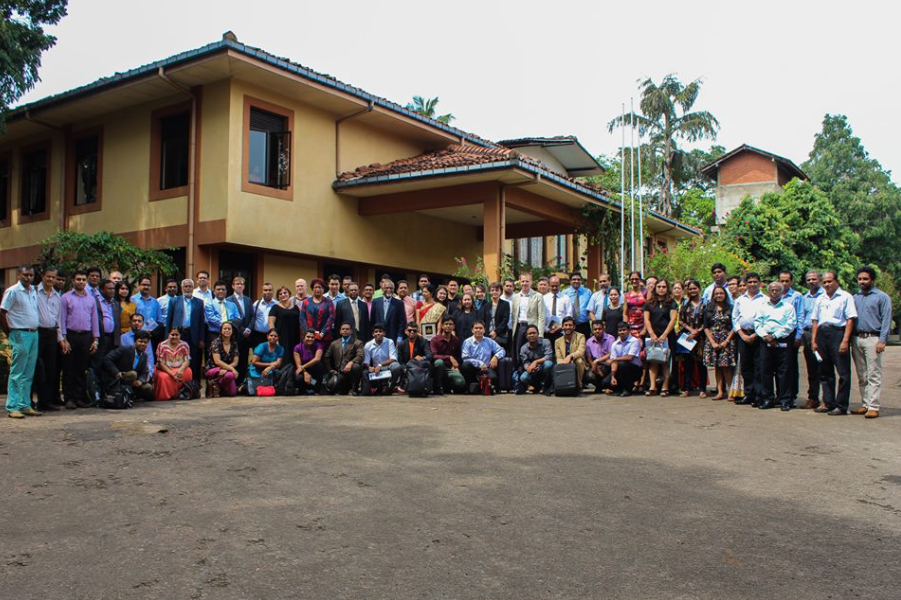
- A panellist of the UN European Science & Technology Advisory Group Plenary meeting held in Geneva, Switzerland. UNDRR-Europe Deputy Chief, Mr. Abhilash Panda chaired the event with the participation of UN SRSG (UN Special Representative of the Secretary-General for Disaster Risk Reduction) for DRR, Ms. Mami Mizutori, Geneva, Switzerland- 14th May 2019
- A panellist of the Round Table discussion on Disaster Risk Reduction and Climate Change Adaptation, hosted by Centre for Engineering and Sustainable Development Research of DLSU University, Manila. Philippines, March 2019
- Regional meeting with European Focal Points and Governments, 14 May 2019, UNISDR. A meeting around representatives and National Focal Points from 55 European and Central Asia Member States. United Nations Global Platform, Geneva, Switzerland
- Science and Policy Forum for the Implementation of Sendai Framework for Disaster Risk Reduction, 13-14 May 2019, Palais des Nations, Geneva. Co-organized by UNISDR Science Technology Advisory Groups (STAG), International Science Council (ISC), and Integrated Research on Disaster Risk (IRDR)
- Facilitator – Forum on Localisation of Sendai (SFDRR) indicators in Sri Lanka, organised by Disaster Management Centre (DMC) and Association of Disaster Risk Management Professionals (ADRiMP), Sri Lanka. 17th January 2019
- Panellist (intervention on barriers and enablers for multi hazard early warning), Forum on Multi Hazard Early Warning Systems and Evacuation Planning in Sri Lanka, organised by CABARET Erasmus+ Higher Education Capacity Building Project, University of Moraruwa, University of Peradeniya, University of Huddersfield, 16th January 2019
- Workshop on Making Cities Resilient: Implementing the Sendai Framework for Disaster Risk Reduction at the Local Level, UNISDR Global Education and Training Institute (UNISDR GETI) , UN-HABITAT City Resilience Profiling Programme, Barcelona, Spain, 13 November 2018
- A participant as an Advocate of the UN the Making Cities Resilient Campaign, the Workshop on Making Cities Resilient: Implementing the Sendai Framework for Disaster Risk Reduction at the Local Level, organised by the UNISDR Global Education and Training Institute (UNISDR GETI) and UN-HABITAT City Resilience Profiling Programme. Dilanthi and Richard are experts of the Campaign appointed as the Advocates to represent the UK, and provide support to the implementation of local DRR and resilience building, 21 to 23 November 2018 in Rome, Italy
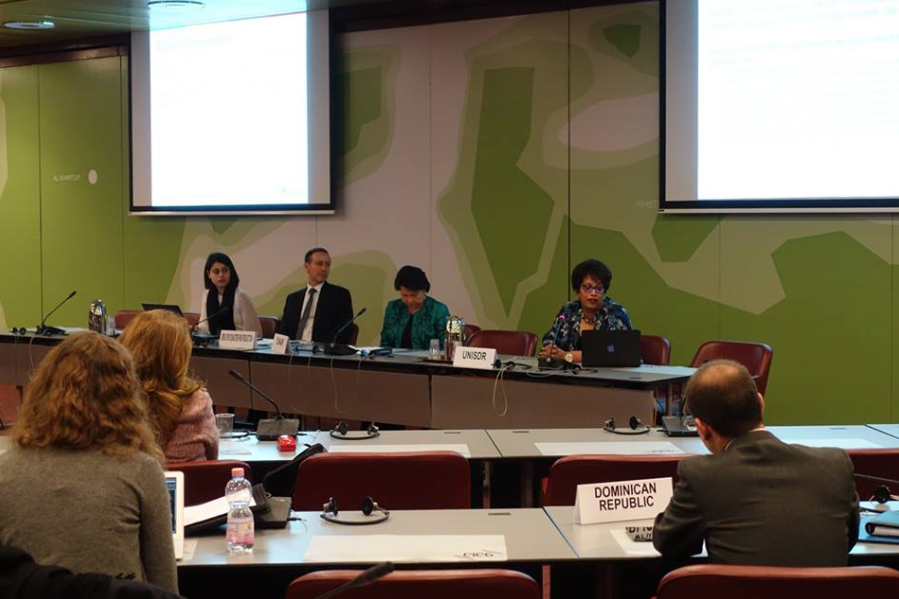
- The Government of Italy and the United Nations Office for Disaster Risk Reduction (UNISDR) in partnership with the European Commission and Council of Europe invited Prof. Dilanthi Amaratunga to the 2018 European Forum for Disaster Risk Reduction (EFDRR), scheduled from 21 to 23 November 2018 in Rome, Italy to address the Working Session “Urban challenges & opportunities” and to be the session moderator.
- Moderator of the session: “Understanding Urban and Local Challenges and opportunities”, at the 2018 European Forum for Disaster Risk Reduction (EFDRR), held from 21 to 23 November 2018 in Rome, Italy. EFDRR was organised by the Government of Italy, UNISDR in partnership with European Commission and Council of Europe. This session debated the key challenges and opportunities to accelerate local level action on disaster resilience, and support progress on Target (e) of the Sendai Framework for Disaster Risk Reduction to substantially increase the number of countries with national and local disaster risk reduction strategies by 2020, including: Integrated Disaster risk reduction (DRR) and climate change adaptation (CCA) strategies, and Large-scale forced migration and displacement.
- Delivered a session entitled: “IO WAVE 2018 – REGIONAL TSUNAMI EXERCISE: Sri Lanka experience”, at the Regional Workshop on lessons learnt from community participation and evaluation of Indian Ocean Tsunami Ready indicators in pilot communities during Exercise Indian Ocean Wave 2018 (IOWave18) held in Jakarta, 15-17 November 2018. This was based on their experiences as the appointed international observers for Sri Lanka for Exercise Indian Ocean Wave 2018 (IOWave18) held on the 5th September 2018.
- Dilanthi Amaratunga delivered a session entitled: “IO WAVE 2018 – REGIONAL TSUNAMI EXERCISE: Sri Lanka experience”, at the Regional Workshop on lessons learnt from community participation and evaluation of Indian Ocean Tsunami Ready indicators in pilot communities during Exercise Indian Ocean Wave 2018 (IOWave18) held in Jakarta, 15-17 November 2018. This was based on their experiences as the appointed international observers for Sri Lanka for Exercise Indian Ocean Wave 2018 (IOWave18) held on the 5th of September 2018.
- Panel lead on a discussionabout the current landscape and future opportunities for advancing the dialogue between DRR and urban cities. International research workshop on: LOCALISING STRATEGIES FOR MAKING CITIES RESILIENT TO DISASTERS, 22th January 2018 to 26th January 2018, Manila, The Philippines.
- Session on about the current landscape and future opportunities for advancing the dialogue between DRR and urban cities.International research workshop on: LOCALISING STRATEGIES FOR MAKING CITIES RESILIENT TO DISASTERS, 22th January 2018 to 26th January 2018, Manila, The Philippines.
- Session on building your research profile, International research workshop on: LOCALISING STRATEGIES FOR MAKING CITIES RESILIENT TO DISASTERS, 22th January 2018 to 26th January 2018, Manila, The Philippines.
- An expert panel to lead a discussion about the current landscape and future opportunities for advancing the dialogue between DRR and urban cities. International research workshop on: LOCALISING STRATEGIES FOR MAKING CITIES RESILIENT TO DISASTERS, 22th January 2018 to 26th January 2018, Manila, The Philippines.
- Session on about the current landscape and future opportunities for advancing the dialogue between DRR and urban cities. International research workshop on: LOCALISING STRATEGIES FOR MAKING CITIES RESILIENT TO DISASTERS, 22th January 2018 to 26th January 2018, Manila, The Philippines.
- Session on building your research profile, . International research workshop on: LOCALISING STRATEGIES FOR MAKING CITIES RESILIENT TO DISASTERS, 22th January 2018 to 26th January 2018, Manila, The Philippines.
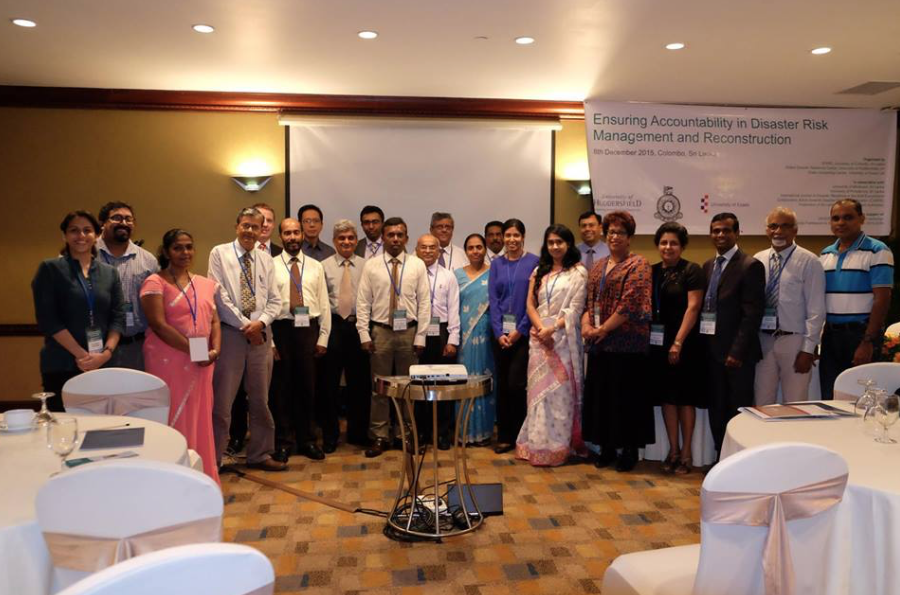
- Co-organiser, Focal Point & a Panellist of the Formal Session on Disaster Risk Reduction Governance at the Global platform for Disaster Risk Reduction, 22 – 26 May 2017, Cancun, Mexico. Other Panellists included: Carlos Iván Márquez Pérez, Director National Unit for Disaster Risk Management in Colombia; María Luisa Romero. Minister of Government of Panama; Dr. Fadi Hamdan, Managing Director. Disaster Risk Management Center (DRMC), Lebanon; and Ms. Natalia Ilieva, Executive Assistant to the Secretary General of Asia Pacific Broadcasting Union (ABU). The Global Platform for Disaster Risk Reduction (Global Platform), as recognized by the UN General Assembly, is the main forum at the global level for strategic advice, coordination, partnership development and the review of progress in the implementation of international instruments on disaster risk reduction. The Global Platform marked the first opportunity for the international community to review global progress in the implementation of the Sendai Framework for Disaster Risk Reduction, which was adopted in Japan in 2015. More than 5,000 participants attended, including policy makers and disaster risk managers.
- Organiser, Focal Point and the Moderator of the Session on DRR Governance at the local level, Local Government Summit day at the Global platform for Disaster Risk Reduction, 22 – 26 May 2017, Cancun, Mexico. This pre-event will consider the need to improve understanding of risk governance at the local level, including accountability and transparency, sharing of risk information, stakeholder participation and public awareness, encouraging action on stakeholder feedback, and sharing best practices
- Session lead, Climate Change Adaptation and Disaster Risk Reduction Challenge Workshop, Wissenschaftszentrum, Bonn, Germany, 4th May 2017
- International Seminar Leader, Mainstreaming Disaster Resilience within the Construction Process. Visit of the High-Level Government and Local Government Delegation from Sri Lanka, 27th January 2017.
- Member of the International Board of Advisors. Article 25. Article 25 works to enable this right by building solutions to global problems. It has worked on over 85 projects in 34 countries. 2017-date
- Expert inputat the National Science Challenge Workshop on “Resilience to Nature’s Challenges”, that was held at the 6th International Building Resilience Conference 2016 in Auckland, New Zealand, from 7-9th of September 2016. The 2015-2019 research programme for Resilience to Nature’s Challenges, National Science Challenge (RNC) applies ~ $4.5 million/year (including contestable research) toward ten programs, working toward the vision that: New Zealand is a nation of people who have transformed their lives, enterprises, and communities to anticipate, adapt and thrive in the face of ever-changing nature’s challenges.
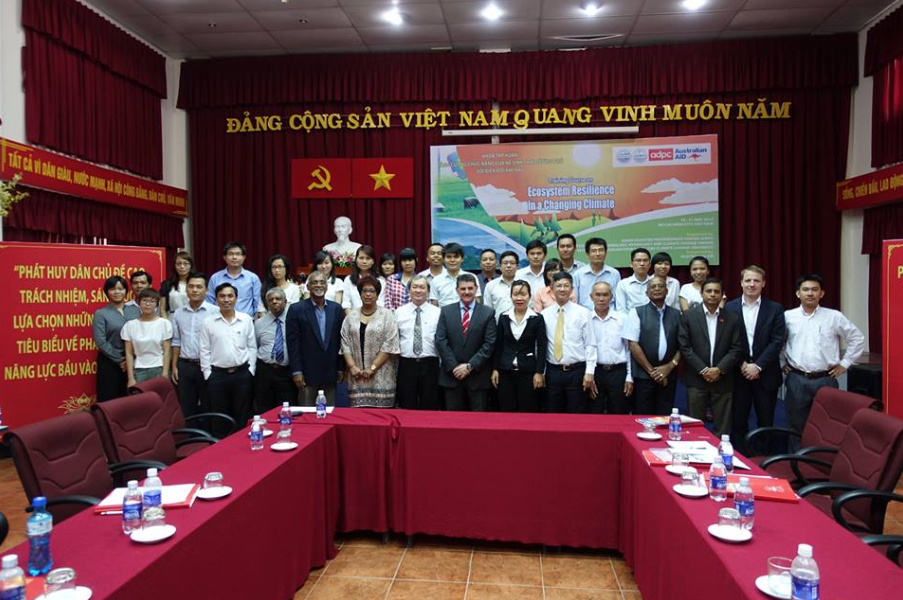
- Public engagement on CADRE and ESPRESSO projects at the Inaugural UKADR conference, hosted by King’s College London, 09–10 January 2017. Themes were Mainstreaming disaster resilience within the construction process and Climate chance adaptation and disaster risk reduction nexus dialogue.
- Expert Adviser,Sri Lanka Community Landslide Risk Mitigation Project, National Building Research Organisation (NBRO) and the World Bank. The aim of the project is to help Government of Sri Lanka in undertaking a systematic approach for reducing the impacts of landslides as landslides are considered to be a major natural hazard. This project is being implemented by Asian Disaster Preparedness Center in partnership with the Norwegian Geotechnical Institute (NGI). since January 2017. (with Richard Haigh)
- Engagement with the public in framing our research programmes that can be usable and used. Public awareness programme on Disaster Management was held on the 8th December 2016 in Nintavur, a village in the Eastern province of Sri Lanka, severely affected by tsunami and now constantly under treat to sea erosion. This was led by Prof. Richard Haigh and I, also with the input from Ms. Hemanthi Goonersekera, the CEO of Federation of Sri Lankan Local Government Authorities and Mr. Valleeth Mohamed of Asia Foundation December 2016.
- Led a workshop for Sri Lankan academics on International collaborations (“Benefits, challenges and enablers for international research partnerships”) at the Sri Lanka National Science Foundation (NSF). I was invited to be one of the lead facilitators by by Dr Thamara F. Dias, Director General of NSF for this work. The National Science Foundation (NSF) is Sri Lanka’s Key Research Funding Council which is committed to generate knowledge, dissemination and transfer of knowledge and, more importantly, to ensure the effective utilization of knowledge, for the greater benefit. December 2016.
- Led a workshop on International Research, upon an invitation received from the Vice Chancellor of University of Moratuwa, Sri Lanka, Prof. Ananada Jayawardena on the 16th December 2016.
- An invited facilitator at the Agenda Setting Workshop entitled “Creating a Resilient Future for Greater Manchester”, held at Manchester Town Hall on the 29thNovember 2016. It was organised by the Greater Manchester Combined Authority (GMCA) and 100 Resilient Cities, a $164 million programme pioneered by The Rockefeller Foundation, where city leaders and practitioners from across Greater Manchester came together to collectively set the agenda for Greater Manchester’s resilience journey. 100 Resilient Cities – Pioneered by The Rockefeller Foundation (100RC) is an initiative dedicated to helping cities to be better prepared for and quickly rebound from 21st century shocks and stresses.
- ‘Towards evidence-based policy’ debate – Reconciliation through Reconstruction and Resettlement. Panel of Experts. The panel explored the emerging evidence and provide a basis for policy development aimed at reconstruction and resettlement that contributes to, rather than hinders reconciliation efforts. Proposers: Siri Hettige, Professor of Sociology Emeritus, University of Colombo, Sri Lanka; Dilanthi Amaratunga, Professor, Global Disaster Resilience Centre, University of Huddersfield, UK; and Richard Haigh, Professor, Global Disaster Resilience Centre, University of Huddersfield, UK. November 2016.
- Session with the RICS (The Royal Institution of Chartered Surveyors) on the topic of “Mainstreaming disaster resilience within the construction process”. Met with Alan Muse (RICS Global Director of Built Environment) and David Tuffin (Former RICS President and the RICS DM Champion). November 2016.
- Contributing partner, Asian Preparedness Partnership (APP). Governments, local humanitarian organizations and the private sector have come together to form the Asian Preparedness Partnership (APP) for strengthening the capacity on preparedness for emergency response in Asia. The APP will strive to improve the interface and partnership between Government, Local Humanitarian Organizations and Private Sector for enhancing capacities through partnerships, knowledge resources, training, and networking opportunities. Commencing September 2017 (with Richard Haigh)
- Public engagement – SPREssO project activities were disseminated to the Public of Huddersfield and Yorkshire, UK. On Friday 30thSeptember 2016, the University of Huddersfield hosted the European Researchers’ Night – a Europe wide free event giving the public a unique opportunity to experience the real face of researchers. “Full STEAM ahead” was the theme for the event and it celebrated the exciting and varied research taking place at the University.
- Mainstreaming Disaster Resilience within the Construction Processes, lead facilitator of the CADRE WORKSHOP on Mainstreaming Disaster Resilience within the Construction Process was held at the 6th International Building Resilience Conference 2016 in Auckland, New Zealand, from 7-9th of September 2016
- Lead facilitator of the Roundtable discussion: on the Direction of the Development of Sendai Framework “Words into Action” Implementation Guide for Construction Policy and Practice, a UNISDR initiative, was held at the recently held 6th International Building Resilience Conference 2016 in Auckland, New Zealand, from 7-9th of September 2016.
- A training event with local government and key stakeholders on “Global agendas for building more sustainable, disaster resilient communities” was facilitated in July 2016 in Eastern Provincial Council of Sri Lanka. Its Minister of Transport Hon. Ariyawathie Galappathi and its Chief Secretary Mr.D.M. Sarath Abayagunawardana led the proceedings with the participation of 20 other government officials from the region.
- A public engagement was held on: “Building sustainable disaster resilient communities” with the support of the Urban Council at Trincomalee Urban Council premises. July 2016
- Session lead, Development of Sendai Framework “Words into Action” Implementation Guides Working Group on DRR Governance and Accountability, Sendai Framework “Words into Action” Implementation Guides Working Group on DRR Governance and Accountability (25th January 2016), UNISDR, Geneva, Switzerland.
- Lead facilitator of an international workshop entitled: “ Market Demands in the Construction Industry to Increase Societal Resilience to Disasters”, 9th December 2015 in Colombo, Sri Lanka as part of the CADRE (Collaborative Action towards Disaster Resilience Education)
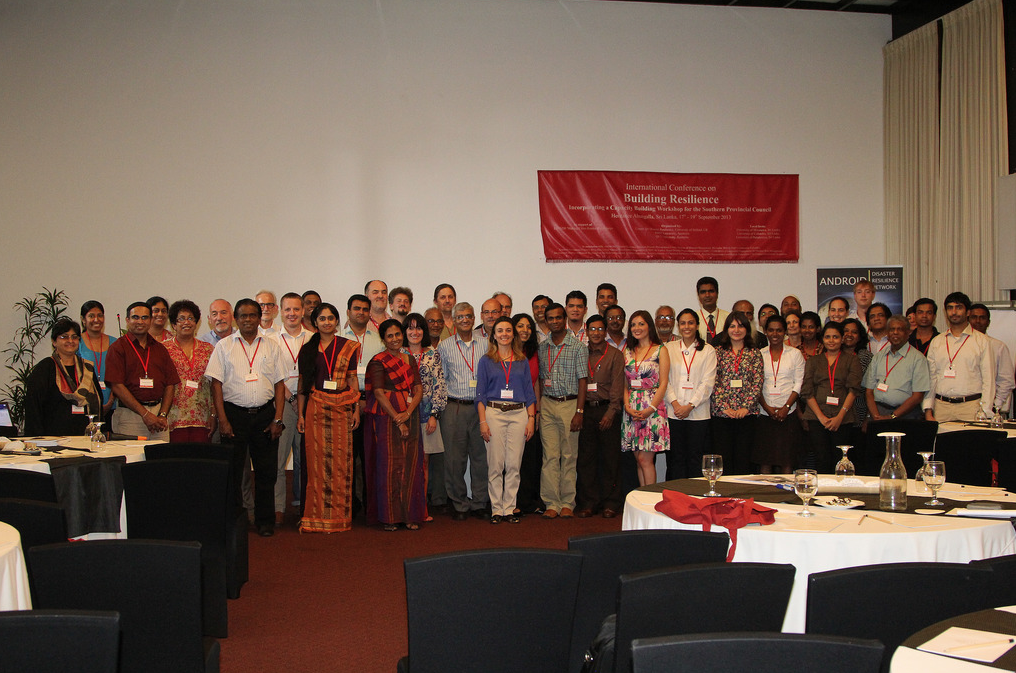
- Facilitator at an international workshop entitled “Ensuring Accountability in Disaster Risk Management and Reconstruction” organized as a part of a global, regional and national partnership by SPARC, University of Colombo-Sri Lanka and Global Disaster Resilience Centre (GDRC), University of Huddersfield-UK, and Essex Accounting Centre, University of Essex-UK on the 8th December 2015 in Colombo Sri Lanka.
- Session lead on “Research funding opportunities” at the British Council and Newton Researcher Links programme, funded multi-disciplinary international workshop entitled Development of Disaster Resilient Coastal Communities to Enhance Economic Development and Social Welfare, Bandung Institute of Technology, Indonesia, from 28th October – 1st November 2015
- Session lead on “Publishing your research” at the British Council and Newton Researcher Links programme, funded multi-disciplinary international workshop entitled Development of Disaster Resilient Coastal Communities to Enhance Economic Development and Social Welfare, Bandung Institute of Technology, Indonesia, from 28th October – 1st November 2015
- Session lead on “Raising Your Profile or How to let others know you are doing OK !!” at the British Council and Newton Researcher Links programme, funded multi-disciplinary international workshop entitled Development of Disaster Resilient Coastal Communities to Enhance Economic Development and Social Welfare, Bandung Institute of Technology, Indonesia, from 28th October – 1st November 2015
- Contributor at the “Leading Disaster Risk Reduction: A seminar on preparing for and responding to disasters”, held on the 1st October 2015 in the Mountbatten Room, Christ’s College, University of Cambridge.
- Organizer and Facilitator Reducing Disaster Risk in Urban Settings – Intergovernmental Segment, Ministerial Roundtable, 16th March 2015, at Sendai International Centre, Japan as part of the UN World Conference on Disaster Risk Reduction.
- Organizer and facilitator – Local Governments Roundtable, The Sendai International Centre in Japan, Third United Nations World Conference on Disaster Reduction (WCDRR), March 2015.
- Session facilitator, Ecosystem Resilience in a Changing Climate. This programme was held from 18th to 21st May 2015 at the SIHYMECC Auditorium, Ho Chi Minh, Vietnam and was organized by the Asian Disaster Preparedness Centre, Thailand. This programme was held from 18th to 21st May 2015 at the SIHYMECC Auditorium, Ho Chi Minh, Vietnam.
- Lead facilitator, open briefing event on CASCADE findings. The major findings from the CASCADE project were presented at an open briefing event at the UK Research Office in Brussels. The event, held on 9th March 2015 was attended by over 25 representatives from European and South Asian government agencies, as well as funding bodies and other research groups. The event was held to raise awareness about the project and the opportunities for research and innovation collaboration between the EU and South Asia
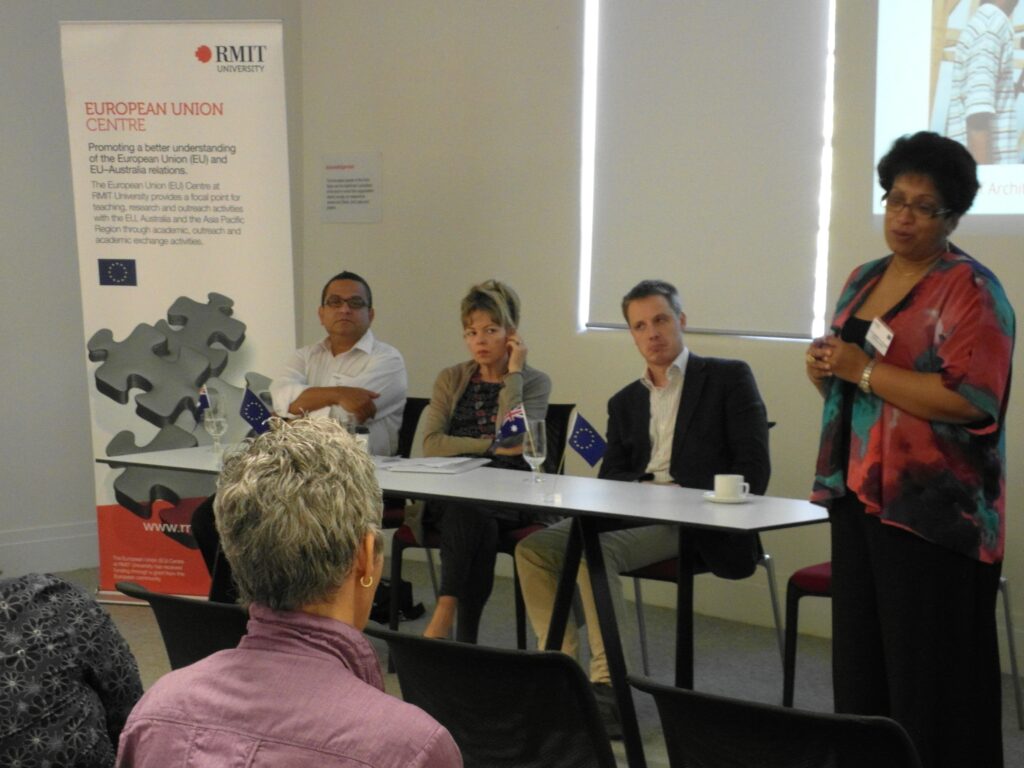
- Lead facilitator, Horizon 2020: Collaborating with EU Researchers for Research Excellence, 2nd December 2014, UGC Auditorium, 20, Ward Place, Colombo 07, Sri Lanka. The University Grants Commission (UGC) is the apex body of the University System in Sri Lanka which. The functions of the UGC are; planning and coordination of university education, allocation of funds to Higher Educational Institutions (HEIs), maintenance of academic standards, regulation of the administration of HEIs and regulation of admission of students to HEIs. Its vision is to be an excellent regulatory body which guide, develop and sustain a network of ‘Centers of Excellence’ in higher education meeting the national needs and aspirations in keeping with global trends. All 15 Sri Lankan universities are under its umbrella: University of Colombo, University of Peradeniya, University of Sri Jayewardenepura, University of Kelaniya, University of Moratuwa, University of Jaffna, University of Ruhuna, The Open University of Sri Lanka, South Eastern University of Sri Lanka, Rajarata University of Sri Lanka, Sabaragamuwa University of Sri Lanka, Wayamba University of Sri Lanka, Uva Wellassa University, University of the Visual & Performing Arts, Vice Chancellors of all these universities along with other scientists attended the event.
- Preparatory Committee (Prep Com) second session discussions, leading up to the third UN World Conference on Disaster Risk Reduction, to be held in Geneva Switzerland in November 2014.
- Session lead, Collaborative Action towards Societal Challenges through Awareness, Development and Education (CASCADE) Regional project – Sri Lanka’s contribution), Science, Systems and Application towards sustainable Disaster Management, the future we want; Safer Sri Lanka; Disaster Management Conference; 24-26 September 2014 – BMICH, Colombo 07, Sri Lanka. Organised by Asian Disaster Preparedness Center (ADPC) in collaboration with Ministry of Disaster Management, Disaster management Centre, Department of Meteorology, National Building Research Organization, Universities of Salford, UK, Peradeniya & Ruhuna, Sri Lanka
- Panel co-lead, panel discussion on Disaster Resilience education, 10th International Conference of The International Institute for Infrastructure Resilience and Reconstruction (I3R2): Collaboration for Effective Disaster Mitigation and Response was held from May 20-22, 2014 Purdue University, Indiana, USA
- Lead facilitator, The Horizon 2020: Teaming up with the EU for Research Excellence, A workshop for Sri Lankan Scientists, organized by the National Science Foundation, Sri Lanka, in collaboration with the European Union. May 2014.
- Lead, Panel discussion on CADRE (Collaborative Action towards Disaster Resilience Education), CIB INTERNATIONAL CONFERENCE 2014: W55/65/89/92/96/102/117 & TG72/74/81/83 Construction in a Changing World; KANDLAMA, SRI LANKA, MAY 2014
- Lead, The Horizon 2020: Teaming up with the EU for Research Excellence – A workshop for Sri Lankan Scientists; organized by the National Science Foundation, Sri Lanka in Collaboration with the European Union, 2 May 2014, At the Auditorium, National Science Foundation, Sri Lanka, in collaboration with CASCADE (Collaborative Action towards Societal Challenges through Awareness, Development, and Education)
- Lead, “Pathways for Sri Lankan Scientists via Horizon 2020: Opportunities for South Asian Institutions – a Workshop for University of Moratuwa Academic staff”, 2nd May 2014, Engineering faculty board room, University of Moratuwa, Sri Lanka, in collaboration with CASCADE (Collaborative Action towards Societal Challenges through Awareness, Development, and Education)
- Session lead, The Horizon 2020 – funding opportunities for research excellence; CIB INTERNATIONAL CONFERENCE 2014: W55/65/89/92/96/102/117 & TG72/74/81/83 Construction in a Changing World; KANDLAMA, SRI LANKA, MAY 2014; in collaboration with CASCADE (Collaborative Action towards Societal Challenges through Awareness, Development, and Education)
- UNHABITAT World Urban Forum – Resilience Dialogue: Raising Standards of Urban Resilience Friday, 11 April 2014, Medellín, Columbia Agenda DRAFT_20 March_2014 (The primary aim of this Dialogue is to demonstrate how a holistic approach to urban resilience that considers all functions of an urban system can contribute to making all cities more equitable places to live and work)
- UNHABITAT World Urban Forum University round table: Universities addressing Urban challenges. 10 April 2014, Medellín, Columbia . Agenda DRAFT_20 March_2014 The roundtable gathered scholars, experts, researchers, university representatives and heads of thematic areas of UN- Habitat to discuss the role of knowledge and education, as well as the possible contributions of universities to address the challenges of sustainable urbanisation in the 21st century.
- UNHABITAT World Urban Forum Gender and women round table – Gender equality and the new urban agenda. 11 April 2014, Medellín, Columbia . It addressed the linkages between gender equality, women’s empowerment and urbanisation as positive drivers of the New Urban Agenda, emphasizing the centrality of gender equality and women’s empowerment in furthering economic growth and achieving sustainable development in the New Urban Agenda. It also identified, developed and promoted strategies for enhancing gender equality and women’s empowerment as an integral part of the transformative change in the New Urban Agenda towards Post-2015, the Sustainable Development Goals and Habitat III.
- I was invited by the European Commission to lead the Horizon 2020 launch for the South Asia region: “The Horizon 2020: Teaming up with EU for Research Excellence”. January 2014, Colombo, Sri Lanka. Horizon 2020 is the new financial programme of the European Union (EU) for research and innovation and acts as the successor to the current programme (FP7) which will run until the end of 2013. It has a budget of just over €70 billion for the period between 2014 and 2020. The new programme is part of the drive to create new growth and jobs in Europe. Horizon 2020 brings together all existing Union research and innovation funding currently provided through the Framework Programme for Research and Technical Development (FP7), the innovation related activities of the Competitiveness and Innovation Framework Programme (CIP) and the European Institute of Innovation and Technology (EIT).
- Workshop Leader on “Capacity Building on Disaster Resilient Measures”, Southern Province, Sri Lanka – 17th September 2013, Herritance Ahungalle, Sri Lanka. In association with International Conference on Building Resilience 2013, Heritance Ahungalla, Sri Lanka 17th – 19th September 2013. Collaborators: Federation of Sri Lankan Local Government Authorities; Southern Provisional Council, Sri Lanka; and Centre for Disaster Resilience, University of Salford; In support of UNISDR Resilient Cities Programme
- National launch of the United Nations Global Assessment Report. In association with International Conference on Building Resilience 2013, Heritance Ahungalla, Sri Lanka 17th – 19th September 2013. The United Nations Office for Disaster Risk Reduction, in its third and the latest edition, emphasises the importance of the business case for disaster risk reduction. It highlights how the transformation of the global economy over the last forty years has led to rapid increases in disaster risk in low, medium and high-income countries, affecting businesses and societies. The GAR report states that economic losses linked to natural disasters are ‘out of control’ and will only increase without more focus on disaster risk management. This can only be reduced with an effective public and private sector partnership. A panel discussion at the Conference provided an opportunity to contextualise the GAR theme within a Sri Lankan context.
- Workshop Leader on “Millennium Development Goals”, Planning Urban and Rural Infrastructure, Development Practice Programme of the University of Peradeniya, Sri Lanka. This is supported by MacArthur Foundation and the Earth Institute, Columbia University and is part of a global network of over 20 similar programmes in 16 countries which have been developed in accordance with the recommendations of the International Commission on Education for Sustainable Development Practice. July 2013
- Workshop Leader on “Poverty and infrastructure”, Planning Urban and Rural Infrastructure, Development Practice Programme of the University of Peradeniya, Sri Lanka. July 2013
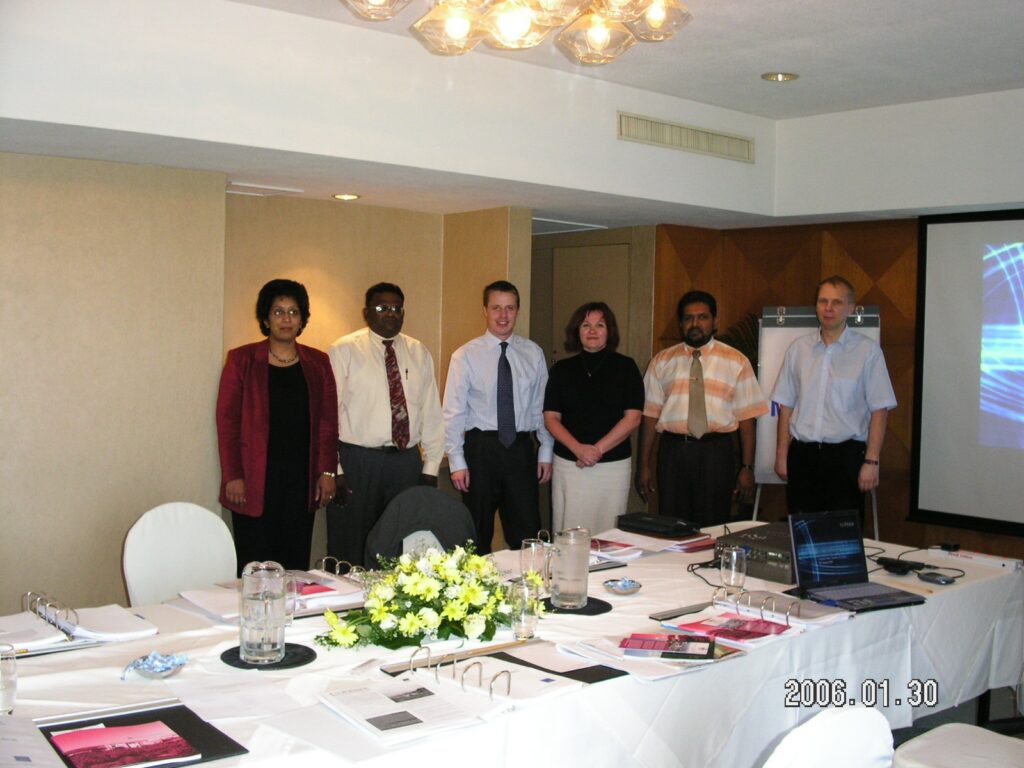
- Workshop Leader on “Writing a good proposal”, Department of Civil Engineering, RAZAK School of Engineering and Advanced Technology, Universiti Teknologi Malaysia, March 2013.
- Workshop Leader on “An insider’s guide to getting published in research journal”, RAZAK School of Engineering and Advanced Technology, Universiti Teknologi Malaysia, March 2013.
- Workshop Lead on Communication Research Needs for Building Societal Resilience, RMIT University, Melbourne, Australia, November 2012.
- Session on Challenges in Managing Housing Needs in Post-Conflict Housing Reconstruction, TOWARDS A RESEARCH PARTNERSHIP IN DISASTER MANAGEMENT AND RESILIENCE SYMPOSIUM, 29th November 2012, RMIT University, Melbourne, Australia
- Session on Rebuilding for Resilience: Post-Disaster Reconstruction of the Built Environment, Breaking the Mould Conference, Durham University Humanitarian Aid and Empowering Local Communities, 1st – 3rd August, 2012, Durham University, Calman Learning Centre, Durham.
- Session on Evaluation of Community Risk Assessment method for development of disaster risk reduction strategies and climate change adaptation plans, Breaking the Mould international conference, Breaking the Mould Conference, Durham University Humanitarian Aid and Empowering Local Communities, 1st – 3rd August, 2012, Durham University, Calman Learning Centre, Durham.
- Creating Disaster Resilient Cities, Breaking the Mould international conference, Durham University Humanitarian Aid and Empowering Local Communities, 1st – 3rd August, 2012, Durham University, Calman Learning Centre, Durham.
- Session lead on “Gender sensitivity in reconstruction”. Seminar on Reconstruction as a tool for conflict transformation and peace building, March 2012, Colombo, Sri Lanka.
- Session on “Ten-point Checklist – Essentials for Making Cities Resilient”, Resilient City Programme, Sri Lanka – Disaster Risk Management Training Program for Local Government Councils, organised by the Ministry of Disaster Management Sri Lanka and Disaster Management Centre, Sri Lanka in Batticaloa, Sri Lanka, March 2012. Participants included representatives from Mannar UC, Eravur UC and Batticaloa MC, District DMC Assistant Directors, Resource Persons and Facilitators
- Workshop and CPD Event Lead – “Lifelong Learning: Challenges and Responses to Quantity Surveying Educational Needs – BELLCURVE (Built Environment Lifelong Learning Challenging University Responses to Vocational Education)”. “Cost management in a real world emerging from adversity”, 15th Pacific Association of Quantity Surveyors Congress, Organised by Institute of Quantity Surveyors Sri Lanka (IQSSL), July 2011, Sri Lanka.
- Session lead, International Conference on Sustainable Built Environment, Kandy, Sri Lanka, December 2010.
- Session lead “Emergency Preparedness” – Annual International Conference on Disaster Management, organized by the International Institute for Infrastructure, Renewal and Reconstruction (IIIRR), USA, in collaboration with American Society of Civil Engineers (ASCE), USA, November 2010
- Session lead. International Workshop on Disaster Risk reduction and Resilient Cities, Batticaloa, Eastern Sri Lanka, June 2010. Resilient Cities Initiative 2010 – 2011. United Nations International Strategy for Disaster Reduction (UNISDR)
- National Training Workshop on Disaster Risk Assessment and Management for the Coastal Zone of Sri Lanka – Developing a knowledge base on Hazards, Vulnerabilities and Capacities for Disaster Risk Reduction, Colombo, Sri Lanka, June 2010
- Session chair, Workshop on Capacity Development for Disaster Risk Reduction in the Built Environment, CIB World Congress 2010: Meeting Society’s Challenges – Disaster Management, CIB World Congress, Salford Quays, Salford, UK, May 2010
- Session lead: “Capacity building for disaster preparedness and reconstruction, at the UNDP National Training Workshop on Disaster Risk Assessment and Management for the Coastal Zone of Sri Lanka – Developing a knowledge base on Hazards, Vulnerabilities and Capacities for Disaster Risk Reduction, Colombo, Sri Lanka
- Session on Disaster “risk reduction and the built environment”, Department of Civil Engineering, University of Melbourne, Melbourne, Australia, March 2010
- Session on “social impact of reconstruction”, Centre for Refugee Studies, York University, Toronto, Canada
- Session lead at the Mini-Symposium organised by the International Institute for Infrastructure, Renewal and Reconstruction (IIIRR), Schulich School of Engineering, University of Calgary, Canada, February 2010. Title of the symposium was “Best practices for disaster management” and the title of the session was “Risk management for community-based post disaster reconstruction”
- Session on disasters and the built environment, Eastern University of Sri Lanka, Batticaloa, Sri Lanka, November 2009.
- Session lead – disaster management applications in the built environment. University of Cape Town, South Africa, October 2009.
- Session lead titled “Capacity building for rehabilitation and reconstruction”. annual international conference on “Impact of natural hazards and disasters on social & economic infrastructure development, organised by the Infrastructure Institute for Renewal & Reconstruction, Ahungalla, Sri Lanka, July 2009.
- Session lead, session title “Disaster Risk Reduction through capacity building – Sharing and Managing the Lessons Learnt from Asian Tsunami”, Ministry of Disaster Management and Human Rights, Disaster Management Centre International Symposium on “Impact of Post Disaster Waste Management towards Disaster Risk Reduction, National Symposium on Promoting Knowledge transfer to Strengthen Disaster Risk Reduction & Climate Change Adoption”, Colombo, Sri Lanka, 2008.
- Leader – EURASIA (European and Asian Infrastructure Advantage) Workshop, The International Symposium on Automation and Robotics in Construction (ISARC 2008) – 25th jubilee symposium. The 25th ISARC (ISARC 2008) was held in Vilnius, Lithuania, from June 27th to 29th of 2008. Title of the session “Development of a Virtual Research Environment to Enhance Collaboration on International Research Projects”
- Invited to lead a weeklong workshop on creation and long-term management of public and commercial facilities and infrastructure at the Department of Building Economics, University of Moratuwa, Sri Lanka. June 2007
- Invited to deliver a series of seminars, workshops and lecturers on long-term management of facilities and infrastructure management at the University of Moratuwa, Sri Lanka. June 2007.
- Invited lectures on: Facilities management concepts; FM Organisational context; Concepts of performance Measurement; FM and its performance measurement; Performance improvement as a continuous process; Building performance and post occupancy evaluation; Moving from performance measurement to management – new directions, Department of Building Economics, University of Moratuwa, Sri Lanka. June 2007
- Invited lecture on Introduction to Facilities Management at the Department of Civil and Environmental Engineering, University of Ruhuna, Sri Lanka. June 2007
- Invited presentation on Development of Research Culture at University of Ruhuna, Sri Lanka. June 2007
- Invited session as part of the 7th International Postgraduate Research Conference in the Built and Human” Environment conference. Held at Salford Quays, Salford: UK, 2007. Workshop entitled “getting published in journals”
- Invited to lead a workshop on PhD research skills and delivered an invited presentation titled “presentation on writing for academic publications” and “surviving the viva”, University of Malaya, Kuala Lumpur, Malaysia, September 2007
- Invited to lead a workshop on PhD research skills and delivered an invited presentation titled “presentation on writing for academic publications” and “surviving the viva”, Universiti Teknologi Mara (UiTM), Shah Alam, Malaysia, September 2007
- Invited to lead a research skills development workshop, CIB World Congress, Cape Town, South Africa, May 2007. This event was organised and hosted by the Southern African Built Environment Research Center (SABERC), Cape Peninsula University of Technology, Cape Town, South Africa and University of Port Elizabeth – Department of Construction Management – Institute for the Study of Construction Processes, South Africa
- Invited to lead a session and deliver a presentation titled “Disaster management and construction” Annual Bank Conference on Development Economics, “The role of the construction industry in disaster preparedness, response and recovery”, The World Bank, Bled, Slovenia, May 2007.
- Invited international workshops and seminars, emphasising the international standing in the field: for e.g. Leader for Session on Disaster Management, RICS COBRA Conference: London, September 2006
- Invited by the CIB (International Council for Research and Innovation in Building and Construction) to develop a set of guidelines on supplementary skills for postgraduate students. 2006
- Invited session as part of the 6th International Postgraduate Research Conference in the Built and Human Environment conference. Held at TNO Delft, The Netherlands, 2006. Workshop entitled “Qualitative data analysis”
- Several invited presentations at national/international teaching and learning conferences, lectures and seminars, most recent being the presentations made at 2nd annual built environment education conference (BEECON 2006) on Recruitment and Retention: The way forward, held in London from 12- 13 September 2006 and Bringing Research and Teaching Together, The Higher Education Academy Conference, November 2006.
- Invited to lead an international research workshops part of the CIB W89 International Conference on Building Education and Research (BEAR2006) held in Hong Kong. Title of the workshop was “Research Methodologies”. 2006
- Invited to lead a special Session on “Post Disaster Management Strategies”. 2006 Royal Institution of Chartered Surveyors (RICS) annual International Conference (COBRA), University College London. Session included an introduction to the work of the RICS Disaster Management Commission and presentations based on three papers titled: “An exploration of the construction industry’s role in disaster preparedness, response and recovery”; “Review of impact of post-tsunami reconstruction and rehabilitation on infrastructure facilities”; and “Role of Built Environment education curricula in post-disaster recovery management”.
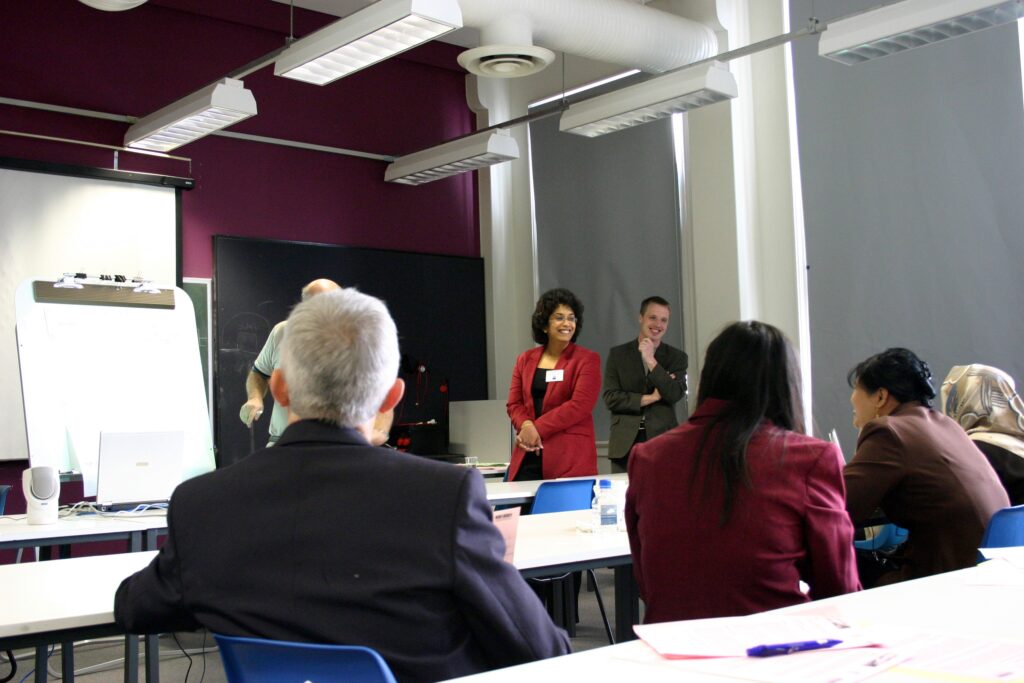
- Invited session as part of the 5th International Postgraduate Research Conference in the Built and Human Environment conference. Held at Salford Quays, Salford: UK, 2005. Workshop entitled “Structuring the thesis and its preparation”
- Facilitator for CIB international research methodology Workshop, CIB W89 BEAR 2006 Conference, Hong Kong: April 2006, Research methods CIOB workshop, QUT, Brisbane, Austrian, July 2005.
- Invited to lead two workshops organised as part of the Queensland University of Technology (QUT) Research Week and RICS COBRA annual International Conference held in Australia. Titles of the workshops held were: “Research Methods” and “Thesis Writing”. 2005
- Invited presentation at Workshop on Teaching and Research Relationship: Developing Institutional Policy and Practice on a UK-wide conference on institutional policies, structures, processes and practices to develop the relationship between teaching and research. Higher Education Academy, London. November 2005.
- Invited session as part of the 4th International Postgraduate Research Conference in the Built and Human Environment conference. Held at Salford Quays, Salford: UK, 2004. Workshop entitled “Completing your PhD successfully”.
- Invited to lead a research methodology workshop. University of Moratuwa, December 2004. Titles of the sessions were: “Overview of Qualitative and Quantitative Paradigms”; “Use of case studies in building and construction research”; and “Use of surveys and interviews to gather data”, 2004.
- Invited by the University of Moratuwa, Sri Lanka to deliver a programme on research methodology (qualitative and quantitative research methods (for built environment research University of Moratuwa, Sri Lanka (Sri Lanka, 2004)
- Invited to lead various staff development workshops for the benefit of fellow members of academic staff and research staff: for e.g. “Good Practice Guidelines for Research Knowledge Transfer into teaching within the Built Environment”, “Improving Dissertation Assessment Practice”. These workshops help to promote ideas and initiative in this area, which has become of critical importance as we seek to exploit our excellent research activities for the benefit of the profession. 2001 – 2004
- Facilitated a workshop on, “Stakeholder engagement to address social vulnerability”, Regional Workshop on Coastal Hazards and applications in Risk Assessment and Mitigation organised by UNESCO/IOC, Paris, 19-22 March 2013, Mount Lavinia Hotel, Sri Lanka.
- Session lead on Gender Mainstreaming in Construction, Chamber of Construction Industry Sri Lanka, Habarana, Sri Lanka, December 2011
- Session Lead on Gender Mainstreaming in Conflict Transformation: The Built Environment’s Perspective, Chamber of Construction Industry Sri Lanka, Habarana, Sri Lanka, December 2011
- Session Lead titled: “Disaster Resilient Built Environment: A Community Based Disaster Risk Reduction Approach”, Patuakhali Science and Technology University, Patuakhali, Bangladesh, September 2011
- Leader, Disaster Management theme, RICS Construction, Building and Real Estate International Research conference (COBRA 2010), September 2010, Paris, France.
- “Building Capacity for Disaster Resilience” Theme Leader, “Total Disaster Management: From Effective Prevention to Post Disaster Full Recovery – “Emergent research themes and directions for the future” Royal Institution of Chartered Surveyors (RICS) seminar, Salford, UK. 2008.
- Session lead on “Capacities, Disasters and the Built Environment: Strategies to enhance capacity for disaster mitigation and reconstruction of the built environment”, Social Development and Transition: Paths for Global-Local Partnership conference, Kathmandu, Nepal, organised by The Asia-Pacific Branch of the International Consortium for Social Development, in Kathmandu, Nepal. November 2008
- Session leader, Building Capacity for Disaster resilience, Royal Institution of Chartered Surveyors (RICS) Total Disaster Management: From Effective Prevention to Post Disaster Full Recovery – “Emergent research themes and directions for the future”, University of Salford, UK, January 2008.
- Invited by the Department of Building Economics, University of Moratuwa, Sri Lanka to deliver a series of lectures on research methodologies for its undergraduate and postgraduate students. December 2004.